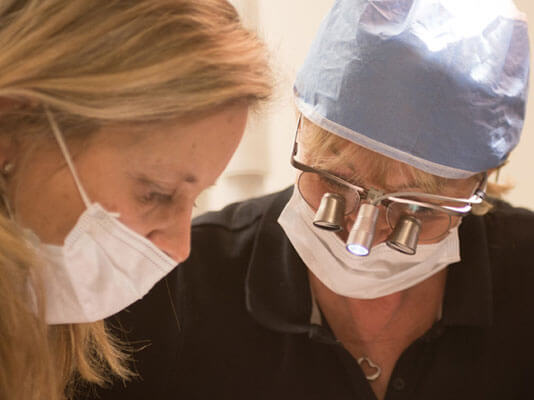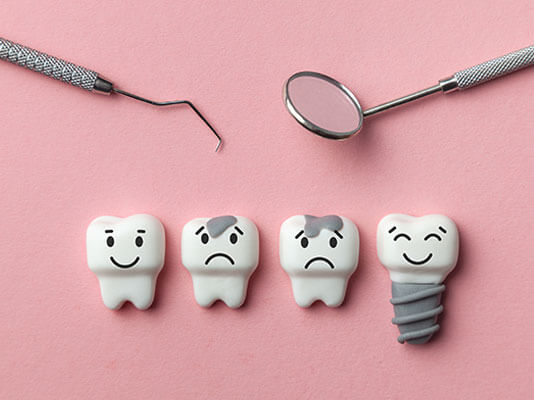About Periodontitis Treatment
Non-surgical treatments including professional hygiene treatments, and antimicrobial and anti-microbiotic therapies. These are particularly good for early cases. However, advanced cases or those unresponsive to non-surgical interventions may necessitate periodontal surgery.
If needed, the objective of periodontal surgery is to cleanse the area, reduce pocket depths, and re-establish a soft tissue contour that can be maintained in regular hygiene appointments. Professional hygiene appointments are imperative to prevent the repopulation of bacteria. It is important to emphasize that without regular 3 month hygiene cleanings the disease will progress and bone, gums and even teeth will be lost.


Periodontal surgery in one site takes one hour. Multiple sites will take longer. Sutures are placed to maintain stability in the area during healing. After 2 weeks normal hygiene and eating habits can be resumed. It takes up to 6 weeks for the gums to achieve their pre-surgical state and one year to achieve a stable state. Some consequences of periodontal surgery include tooth spaces, longer teeth, and sensitivity (usually short lived).
If you are avoiding treatment of your gum disease because of anxiety, you may be a candidate for sedation. We have multiple options from nitrous oxide (laughing gas) to full sleep sedation administered by a medical anaesthesiologist.
Options for Periodontal Surgery
There are many options for periodontal surgery. The most appropriate stage for you may be determined by the stage of your gum disease. If you have questions about which procedure will be most effective for you, Dr. Suzanne Caudry’s office will be able to assist you.
Periodontal surgery options include the following:
Dental Crown Lengthening: Reducing gum tissue where necessary to allow more of the tooth to be above the gum’s surface.
Soft Tissue Graft: Reducing the gum recession to protect the tooth root from further damage.
Bone Graft and Tissue Graft: Preparing for a dental implant or restabilizing of an existing tooth by grafting more volume and density to the areas that have endured bone loss.
Gum Grafting (Gingival Graft): Removing a piece of tissue from either the top of your mouth or nearby healthy gums, then placing it around the tooth experiencing gum recession.
Pocket Reduction Surgery (Gum Flap Surgery): Temporarily separating the tooth from the gum to clean out the infected root.
Contact our offices today to find out more about which option is the best treatment for your situation.
Options for Nonsurgical Periodontal Treatment
If you’re diagnosed with an early stage of periodontitis that hasn’t advanced, you may be a candidate for less invasive procedures. These options may include:
Scaling: Remove tartar buildup and bacteria from your tooth surfaces and beneath your gums.
Root Planing: Smoothing the root surfaces to prevent further tarter and bacteria buildup and removing bacterial by-products that impede the healing of the gums.
Antibiotics: Prescribing antibiotics to help manage and prevent further bacterial infection.
Frequently Asked Questions
What causes periodontal disease (Periodontitis)?
Periodontitis is caused by any condition that promotes bacterial infection around teeth. These include a patient’s medical condition, not adhering to ongoing maintenance, or a lack of adequate oral hygiene.
What will increase my risk of getting Periodontitis?
Any factors that increase bacterial growth will increase your risks of periodontitis. The major risk factors include:
- Poor oral hygiene
- Smoking
- Poorly controlled diabetes
- Non-compliance with prescribed hygiene maintenance program
Other risk factors include:
- Aging
- Genetic predisposition
- Systemic diseases and conditions
- Stress
- Inadequate nutrition
- Puberty
- Hormonal fluctuations
- Pregnancy
- Substance abuse
- HIV infection
- Certain medications
How is Periodontitis diagnosed?
- Patient symptoms may include: pain, tooth mobility, bad taste, and bleeding gums. It is important to note that in most cases there may be no symptoms noticed.
- Signs observed by your dentist or hygienist include: suppuration (pus), bleeding, progressive bone loss, and increasing probing depths around all or some teeth.
Am I a candidate for periodontal surgery?
If you have severe or advanced oral disease around your gums and the tissues supporting your teeth, you may be a candidate for periodontal surgery.
The symptoms we look for include:
- If the gums are swollen, red, tender, or bleeding
- If there are deep pockets that have formed between your gums and teeth
- If you have any loose teeth
- If you have consistent pain when chewing
- If you suffer from bad breath
- If you have receding gums or gums that are pulled away from the teeth
Keep in mind that having one or more of these symptoms doesn't automatically mean you’re suffering from gum disease. If you suspect you may have an early stage of gum disease or have many symptoms indicating you have gum disease in its late stages, we welcome you to contact our office to schedule an appointment.
Do I have Periondontal disease?
To protect your oral health, learn to recognize the signs of infection. Periodontal disease symptoms include:
- red, inflamed gums
- bleeding gums
- Receding gums
- Loose teeth
- Chronic bad breath
- Pus around teeth and gums
- Changes in bite
How is Periodontitis treated?
There are multiple ways in which periodontitis can be addressed, both surgically and non-surgically. The precise treatment plan depends on your unique conditions. In most cases a regular hygiene regimen with antimicrobial and anti-microbiotic therapies are prescribed. In some cases periodontal surgery is needed.
What are the consequences if Periodontitis is not treated?
Often the initial symptoms of Periodontitis are very mild and may not be noticed by the patient. Without treatment, the disease progresses, bacteria infect the gums and bone, at which point the teeth can become loose and may have to be removed.
When is periodontal surgery necessary?
Periodontal surgery is necessary if gum disease has reached an advanced stage where the damage can’t be reversed. Severe gum damage and bone loss can’t regenerate without medical intervention, so the sooner gum disease is treated, the better the prognosis for your gums and oral health. In most cases, gum disease will respond positively to periodontal surgery, but the speed at which it responds is based on the extent of gum damage.
While periodontal disease isn’t reversible, your mouth, jaw, and smile can be restored with the proper treatment. Dental implants may be required to replace missing or decaying teeth if the gum disease is in its late stages or if surgery can correct it. If bone loss is extensive, preparation will be needed to ensure the jawbone can adequately support the tooth implant.
Can I get peridontitis around an implant?
You might have heard of the term “peri-implantitis.” This refers to the infection of a dental implant as a result of oral trauma, existing infections, or improper oral hygienic practices. As we always remind our patients, a dental implant isn’t a silver bullet against dental issues. Your new implant, gums, and surrounding teeth must be looked after if you want your smile to look as good as new in the years to come.
Same as with our teeth, bacterial infections can affect the tissue around an implant. This is a similar disease called peri-implantitis Adhering to your prescribed hygiene regimen is the most important action to prevent this from happening to you. If you think you may have a problem with your implant(s) (pain or tenderness, bleeding, mobility, difficulty cleaning) contact us and we can help.
Will periodontitis impact my chances of receiving an implant?
Many people wonder if periodontitis will impact their chances of receiving a long-awaiting or hoped-for dental implant. The answer to this question is yes. While there might still be an opportunity for a successful implant procedure, many professionals hesitate to subject a patient to oral surgery in cases where periodontitis already exists. It’s never wise to undergo surgical procedures when one doesn’t have an optimal bill of health.
That said, your periodontist might not completely rule out the implant procedure. They might recommend a number of treatments to mitigate—or even reverse—your gum disease. If your oral health improves over time, your oral surgeon may deem you fit to receive a dental implant.
Am I at risk of having periodontal disease?
Those who neglect to take proper care of their teeth and gums are certainly at risk of developing gum disease over time, but those aren’t the only risk factors that exist. Individuals with compromised immune systems also find themselves at risk of contracting periodontal disease, as well. Immunocompromised individuals should remain diligent in the fight against plaque, tartar, and oral trauma at every turn for this reason.
Early Signs of Periodontitis
Gingivitis is one of the first warning signs of periodontitis, which are oral problems that affect your gums. Without good oral hygiene practices, plaque may build up on your teeth and gums. The bacteria in the plaque will cause your immune system to wreak havoc on your gums, resulting in red, swollen, or bleeding gums. Treatment for this condition is usually simple and painless-it's just a matter of figuring out how to deal with it before it gets worse.
Can gingivitis be stopped?
Gum disease and gingivitis usually start with plaque and tartar buildup. In the earliest stages of gingivitis, these problems can be reversed by taking a rigorous hygienic approach to your teeth and gums. If we don't remove the build-up, gum health will only worsen. For the best results, we must remove plaque and tartar, so your gums have a chance to fully recover.
What does proper oral care look like in the fight against gingivitis and periodontal disease?
Oral care is more straightforward than you might think. Use a soft-bristled toothbrush two to three times per day, floss after every meal, use fluoride mouth rinse on a daily basis, and always show up for routine dental appointments. You'll be surprised at what a little commitment to oral health will do for your teeth and guns in the short term and long term.
Often, the first solution for gingivitis and periodontal disease isn't a complicated dental procedure, but a regular, non-invasive series of day-to-day steps that help your teeth and gums improve their health over time. We're here to help get you back on track to taking care of your teeth every day and ensuring their well-being over time. Reach out anytime for assistance from our team of dental professionals.
Learn More About Gum Disease Today
Our front office team will assist with scheduling your appointments, and processing dental insurance claims. We will answer all your question and concerns before any treatment begins. We strive to ensure our patients receive the most conservative treatment plan that will lead to the best treatment outcome. You do not need a referral to have a consultation.
Periodontal Disease After Treatment
Various factors, such as your physical health, the extent of your periodontal disease, and the specific treatment selected will influence your recovery. Prior to your treatment with us, we will discuss aftercare guidelines and expectations to ensure you are on a quick road to recovery.
Here are some of the things we will review with you:
- It's common to experience mild bleeding, tenderness, and discomfort following any surgical procedure. However, these symptoms typically subside within a few days.
- We strongly advise refraining from smoking after undergoing periodontal disease treatment, as smoking can negatively impact your body's ability to heal.
- You may be prescribed a specialized mouth rinse or antibiotics post-surgery, and it's crucial to use these as directed for optimal results.
- We recommend adhering to a soft food diet for at least one week following your periodontitis treatment.
As our patient, we will provide you with written instructions to follow to aid in the recovery process.
Preparing for Periodontal Disease Surgery Treatment
Feeling nervous or anxious before oral surgery is normal, but preparation can ease your concerns. During an oral consultation with our expert team, we will discuss your surgery expectations and medical history.
Here are the instructions we will review with you:
- If you smoke, quitting can help prevent complications like dry sockets, which can be painful.
- Arrange transportation for your surgery day since the effects of anesthesia may prevent you from driving afterward. Having someone stay with you for a few days can provide support and assist with tasks.
- Before surgery, avoid food and drink for at least eight hours (unless advised otherwise) and abstain from alcohol for 24 hours afterward.
- Ensure prescribed medications, like painkillers and antibiotics, are ready at home.
- Prepare your living space with essentials like reading materials, entertainment, and soft foods for immediate consumption.
- Cold compresses can help with post-surgery pain and swelling.
Following these post-operative care instructions will be the key to a speedy recovery.
What to Expect During the Periodontal Disease Treatment
During periodontal disease treatment, you can expect a comprehensive and personalized approach to address your specific gum health issues. To begin, we will conduct a preliminary oral consultation to gather a thorough examination and assessment of the gums, teeth, and oral health. This is a necessary step to develop a personalized treatment plan. Common treatments may include scaling and root planing to remove plaque and tartar buildup and smoothing the tooth roots to promote gum reattachment. Alternatively, we will discuss more aggressive forms of treatment.
Throughout the treatment process, you can anticipate a strong emphasis on oral hygiene education and ongoing maintenance to prevent future issues and maintain optimal gum health. Overall, our treatment plans aim to halt the progression of the disease, alleviate discomfort, and preserve the integrity of the gums and supporting structures. Depending on the procedure administered, the process will vary. However, you can expect a complete walkthrough prior to treatment day to help you prepare and feel at ease going into it.
Call our office to book an oral consultation.
Global Speaking Engagements and the Caudry Education Centre
Over the past 20 years Dr. Caudry has travelled the world imparting her knowledge, research, and technical skills to other Dental professionals.
Today Dr. Caudry carries on the tradition of using her exceptionally high level of education and surgical skills to the benefit of her patients while sharing those skills and experiences with her colleagues so they too can provide her knowledge and techniques to their patients.
Learn More
